Introduction
Fatigue is a common complaint among patients with chronic disease (Goërtz et al. 2021). It is a complex, multicausal and subjective phenomenon (Tiesinga et al. 1996) that is considered a symptom when it interferes with the ability to function and perform activities (Ream and Richardson 1997).
Although no definition is widely accepted, fatigue is generally regarded as the sense of feeling weak, tired, exhausted or with inadequate energy before, during or after daily routine activities (Cornuz et al. 2006; Nicholson et al. 2015). Its intensity, duration, and origin (physical, mental, or emotional) vary widely (Dittner et al. 2004; Galland-Decker et al. 2019).
While experiencing fatigue in general populations is both expected and easily manageable, fatigue associated with healthcare conditions often requires special attention and care, does not improve by resting, and is persistent and/or severe (Dittner et al. 2004).
Studies looking at condition-specific fatigue report a higher burden for the condition when fatigue is involved than when it is not (Le et al. 2022; Regueiro et al. 2023). For example, one recent study found that fatigue was associated with higher levels of disease activity and decreased work productivity in patients with inflammatory bowel disease (IBD) (Regueiro et al. 2023), while another recent study found that fatigue was associated with increased healthcare resource utilisation and total medical costs among patients with IBD (Ananthakrishnan et al. 2023).
Since fatigue is a shared symptom of several long-term conditions, there are thought to be similarities and differences in experiencing fatigue across the conditions. A meta-synthesis revealed that the experience of fatigue, severity, trajectory, and impact on sleep in long-term conditions are unique from the patients’ previous fatigue experiences, with condition-specific patterns for cancer-related and post-stroke fatigue (Whitehead et al. 2016). This uniqueness was described by patients in another study as having an “unfamiliar body”, while patients found it invisible, uncontrollable, and unpredictable (Eilertsen et al. 2015). Another recent review reported heterogeneity of methods used to study fatigue, making comparisons difficult across rare conditions (Bathen et al. 2022).
While some scientists attempt to understand and tackle fatigue as a symptom, others focus on discussing its underlying mechanisms (Raizen et al. 2023). Because of being shared across many conditions, understanding and managing fatigue requires cross-condition collaboration. The current analysis, funded by Crohn’s & Colitis UK, focuses on fatigue in patients with IBD and takes the first steps towards building such collaboration by identifying potential members and funders and presenting a map of studied topics and remaining gaps.
Objectives
The objectives of this review were to identify, across the UK and globally:
a) Research topics, methods and techniques used in IBD fatigue publications
b) Research groups/institutions who have worked on IBD fatigue
c) Researchers in the field of fatigue and IBD fatigue
d) Top funders of IBD fatigue research
e) Journals publishing IBD fatigue research
Methods
This study used components of scientometrics analysis, content analysis, systematic review, and gap analysis. Scientometric techniques were used to identify potential members for the research collaboration at the country, institutional, and individual levels. Content analysis identified the studied topics and research methods in the field. We applied components of systematic reviewing, such as systematic searching and screening, for finding and organising the most relevant research. Finally, we discussed the possible gaps in research and research methods.
Searching and screening
The searches were designed by one information specialist and peer-reviewed by another independent information specialist outside our team before running the searches.
We searched the following sources of literature:
The search dates, search strategies, and the number of search results are reported in Box 1.
Box 1. Search strategies.
IBD Fatigue - PubMed on 11 June 2023
(“Inflammatory Bowel Diseases”[MH] OR “Colitis, Ulcerative”[MH] OR “Crohn Disease”[MH] OR Inflammatory Bowel Disease*[TI] OR Crohn*[TI] OR Colitis [TI] OR Enteritis [TI] OR Ileitis [TI] OR Ileocolitis [TI] OR Proctocolitis [TI]) AND (Fatigue [MH] OR "Fatigue Syndrome, Chronic"[MH] OR Fatigue*[TI] OR Lassitude*[TI])
301
IBD Fatigue UK - PubMed on 11 June 2023
(“Inflammatory Bowel Diseases”[MH] OR “Colitis, Ulcerative”[MH] OR “Crohn Disease”[MH] OR Inflammatory Bowel Disease*[TI] OR Crohn*[TI] OR Colitis [TI] OR Enteritis [TI] OR Ileitis [TI] OR Ileocolitis [TI] OR Proctocolitis [TI]) AND (Fatigue [MH] OR “Fatigue Syndrome, Chronic”[MH] OR Fatigue*[TI] OR Lassitude*[TI]) AND (UK [Affiliation] OR “United Kingdom”[Affiliation] OR England [Affiliation] OR Scotland [Affiliation] OR Wales [Affiliation])
54
Fatigue UK - PubMed on 11 June 2023
(Fatigue*[TI] AND (UK [Affiliation] OR “United Kingdom”[Affiliation] OR England [Affiliation] OR Scotland [Affiliation] OR Wales [Affiliation]))
2950 (1336 excluded, 1614 included in the analysis)
IBD Fatigue - MEDLINE via Web of Science on 6 July 2023
# Web of Science Search Strategy (v0.1)
# Database: MEDLINE®
# Entitlements:
# Searches:
1: Fatigue (MeSH Heading (No Explode)) OR Fatigue Syndrome, Chronic (MeSH Heading) OR Mental Fatigue (MeSH Heading (No Explode)) Date Run: Thu Jul 06 2023 19:17:24 GMT+0100 (British Summer Time) Results: 42121
2: Inflammatory Bowel Diseases (MeSH Heading) OR Colitis, Ulcerative (MeSH Heading) OR Crohn Disease (MeSH Heading (No Explode)) Date Run: Thu Jul 06 2023 19:18:02 GMT+0100 (British Summer Time) Results: 96745
3: #2 AND #1 Date Run: Thu Jul 06 2023 19:18:41 GMT+0100 (British Summer Time) Results: 261
IBD Fatigue - Science Citation Index-Expanded via Web of Science on 6 July 2023
# Web of Science Search Strategy (v0.1)
# Database: Web of Science Core Collection
# Entitlements:
# Searches:
1: Fatigue* (Title) OR Fatigue* (Author Keywords) Editions: WOS.SCI Date Run: Thu Jul 06 2023 22:00:57 GMT+0100 (British Summer Time) Results: 118160
2: Inflammatory Bowel Disease* OR Colitis OR Crohn* (Title) OR Inflammatory Bowel Disease* OR Colitis OR Crohn* (Author Keywords) Editions: WOS.SCI Date Run: Thu Jul 06 2023 22:02:32 GMT+0100 (British Summer Time) Results: 144084
3: #1 AND #2 Editions: WOS.SCI Date Run: Thu Jul 06 2023 22:05:57 GMT+0100 (British Summer Time) Results: 290
The search results from PubMed (MEDLINE) on fatigue were exported from the database and imported to EndNote X9. One reviewer screened the title of each record, assigning the records to include or exclude categories. A second reviewer screened the records, assigning them to healthcare conditions.
Eligibility criteria (inclusion and exclusion criteria)
Records were considered irrelevant and excluded from this review if they focused on the following concepts without specifying a healthcare condition:
Studies on animals, alert/alarm fatigue, fatigue anaesthesiology, auditory fatigue, change fatigue, cognitive fatigue, compassion fatigue, covid-19, pandemic or post-infection fatigue, decision fatigue, dental materials fatigue, driving fatigue, fatigue in the elderly, emotional fatigue, fatigue in the healthy population, flight fatigue (aviation industry), fatigue among health personnel, haemodialysis fatigue, insomnia fatigue, measuring fatigue, mental fatigue, fatigue in military personnel, monitor watchers fatigue, muscle fatigue, occupational fatigue, ocular fatigue, postoperative fatigue, pregnancy fatigue, fatigue in sports, physical fatigue, vaccine counselling fatigue, Zoom fatigue, or fatigue in material science.
Records related to the following conditions and concepts were included in the scientometric analysis of fatigue publications to identify the top authors on papers related to fatigue:
Ankylosing spondylitis, brain injury, cancer, chronic fatigue syndrome, chronic obstructive pulmonary disease, cystic fibrosis, depression, disabling fatigue, unexplained fatigue, fibromyalgia, granulomatosis with polyangiitis, heart failure, immune thrombocytopenic purpura, inflammatory arthritis, inflammatory bowel diseases, lupus nephritis, multiple sclerosis, neurofibromatosis, neuromuscular diseases (Charcot-Marie-Tooth disease, chronic inflammatory demyelinating polyneuropathy, and motor neuron disease), osteoarthritis, palliative care, Parkinson’s disease, post-stroke fatigue, primary biliary cirrhosis, psoriatic arthritis, rheumatoid arthritis, sarcoidosis, sickle cell disease, Sjogren syndrome, spinal cord injury, spinal muscular atrophy, spondylarthritis, subarachnoid haemorrhage, systemic lupus erythematosus, systemic sclerosis, unexplained fatigue, and vasculitis.
After consultation with the funder (Crohn’s & Colitis UK) and considering the availability of records to conduct scientometric analysis, we selected the following conditions from the above list for further analysis and identification of cross-condition authors in the field of fatigue: cancer (236 records), chronic fatigue syndrome (CFS; 866 records), IBD (38 records), multiple sclerosis (MS; 122 records), post-stroke fatigue (PSF; 67 records), and rheumatoid arthritis (RA; 65 records).
Data extraction
We extracted the following data, where relevant:
• Publicly available author names of top authors
• List of top authors’ affiliations
• Top authors’ email addresses (not reported in the paper for GDPR compliance)
• Top authors’ healthcare conditions of expertise
• Journal titles published most IBD fatigue research
• Research topics including healthcare conditions/problems, age groups, interventions, outcomes, research methods and techniques using Medical Subject Headings and subheadings (MeSH)
• Research groups/institutions
• Researchers’ country
• Funders of IBD fatigue research
Data analysis/visualisation
After running searches in each source, we used the following methods to analyse/visualise data:
1. Analysis and visualisation on the source platform (WoS and Scopus).
2. Exporting full records from SCIE to VOSviewer to create co-authorship networks.
3. Validating SCIE data in Notepad++ and finding and correcting the errors.
4. Exporting the results to EndNote for healthcare condition subgroup identification.
5. Exporting from EndNote to RTF and Microsoft Word file format based on customised output filter.
6. Exporting EndNote data into Excel for subtotal analysis, data de-duplication, and data visualisation.
Results
Topic analysis: Problems, outcomes, and interventions in IBD fatigue publications
A topic analysis (Figure 1) based on the subject headings from MeSH with 10 or more MEDLINE-indexed papers related to IBD fatigue showed that most papers focused on problems and outcomes associated with IBD fatigue. Quality of life, followed by severity of illness index and psychological outcomes (depression and anxiety), were the most researched topics. Physiological outcomes (pain, sleep, diarrhoea, and weight loss) were among the next priorities for the researchers. Two main interventions of interest for the researchers were exercise and Infliximab, and two highly researched biomarkers were C reactive protein (CRP) and tumour necrosis factor-alpha (TNFα). The findings also show the researchers’ interest in patient-reported outcome measures and risk factors.
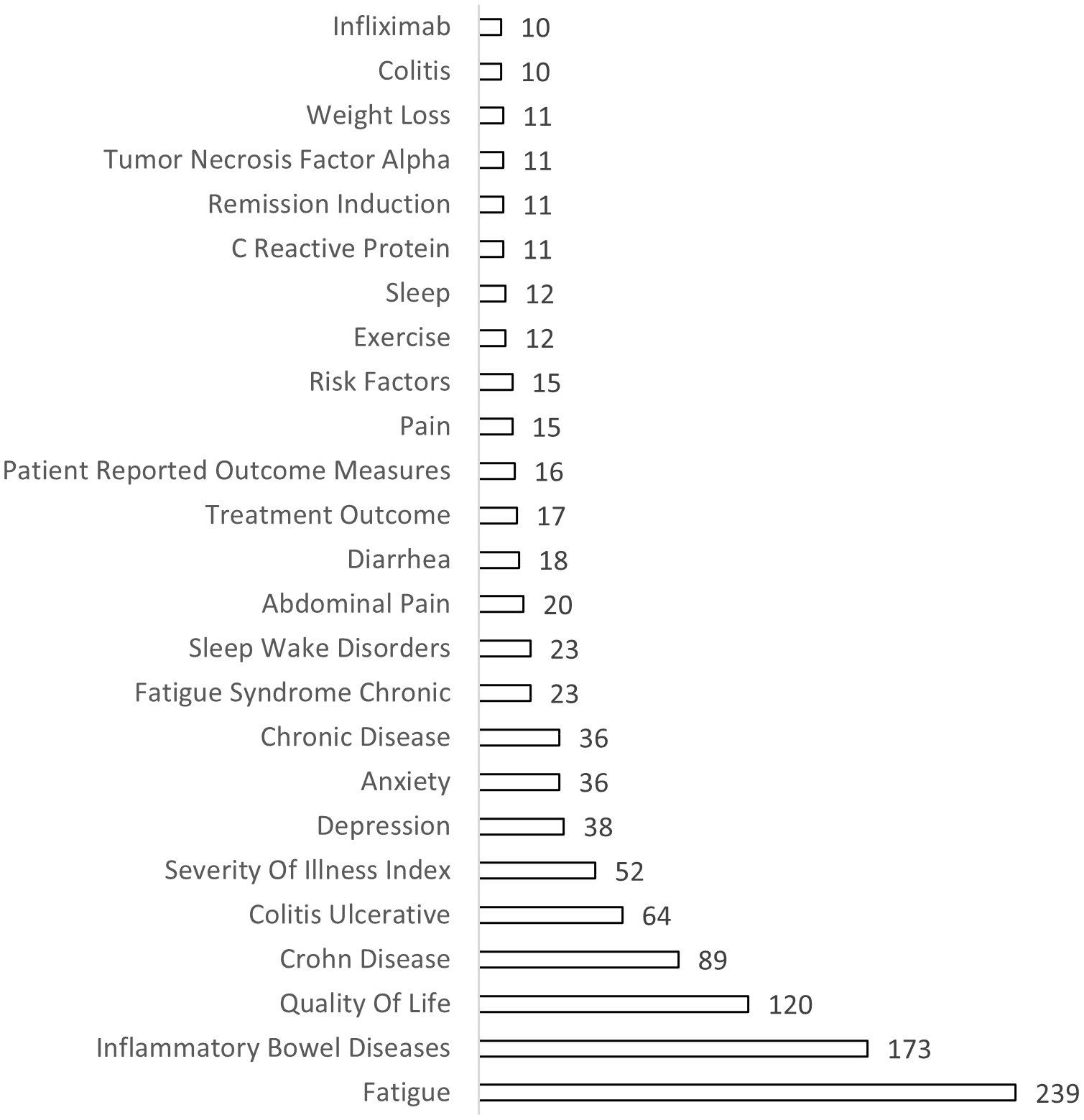
Figure 1. Analysis of IBD fatigue topics with 10 or more publications indexed in MEDLINE (via Web of Science).
Topic analysis: Research methods and techniques used in IBD fatigue publications
Surveys and questionnaires were the most used research methods for collecting and reporting data. Observational, cross-sectional, prospective, prevalence, case-control, cohort, and follow-up studies were the next in the ranking of research methods. The number of publications using interventional study designs, such as randomised controlled trials and qualitative studies, is less than observational studies (Figure 2).
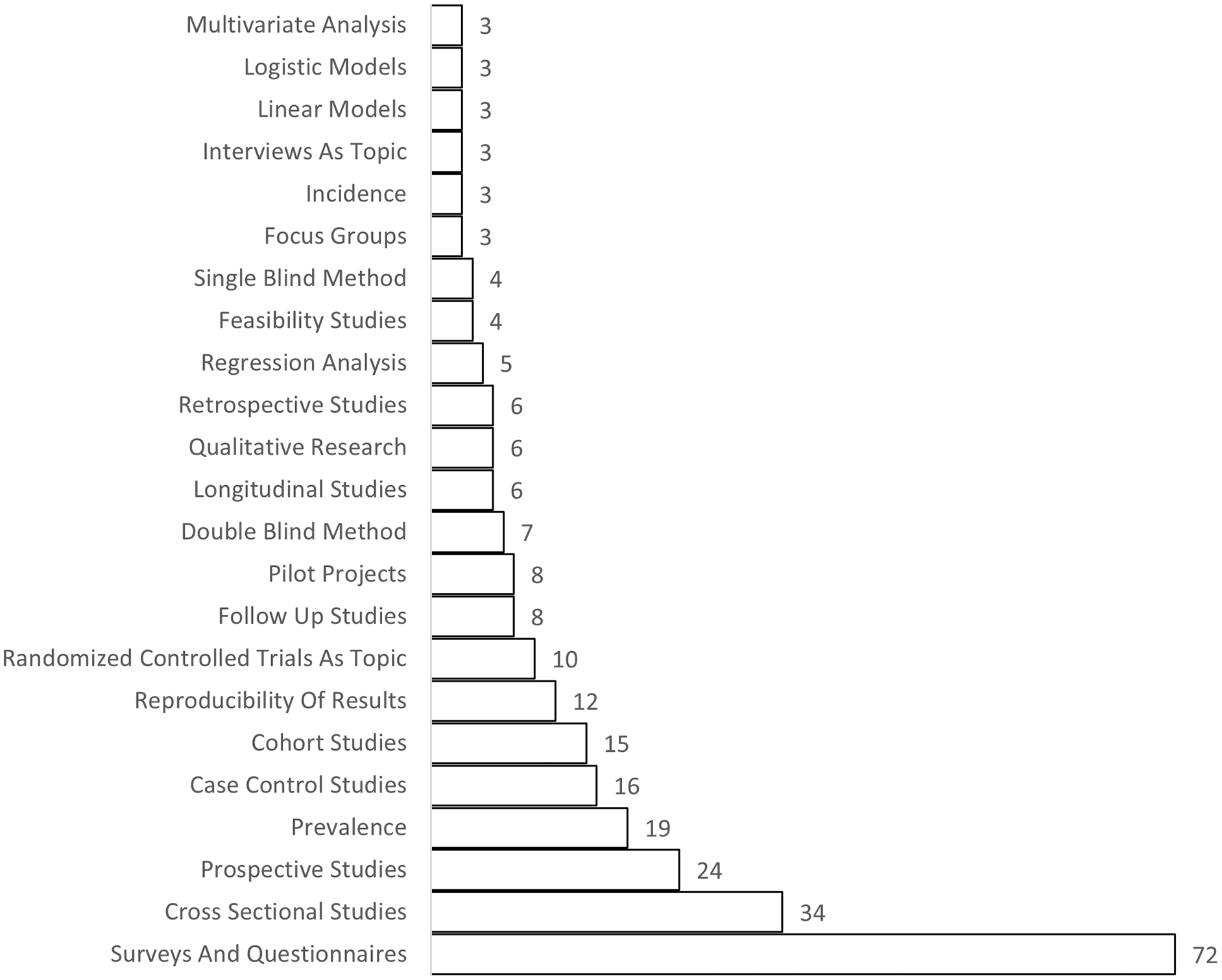
Figure 2. Research methods and techniques used in IBD fatigue publications indexed in MEDLINE (via Web of Science).
Topic analysis: Age groups of participants in IBD fatigue research
Most publications focused on adults (19-44 years old) and middle-aged participants (45-65 years old). Older adults (65 years of age or older), adolescents (13-18 years old), and young adults (19-24 years old) had a similar number of publications, and there were few publications on children (2-12 years old) or the older people (aged 80 or over) (Figure 3).
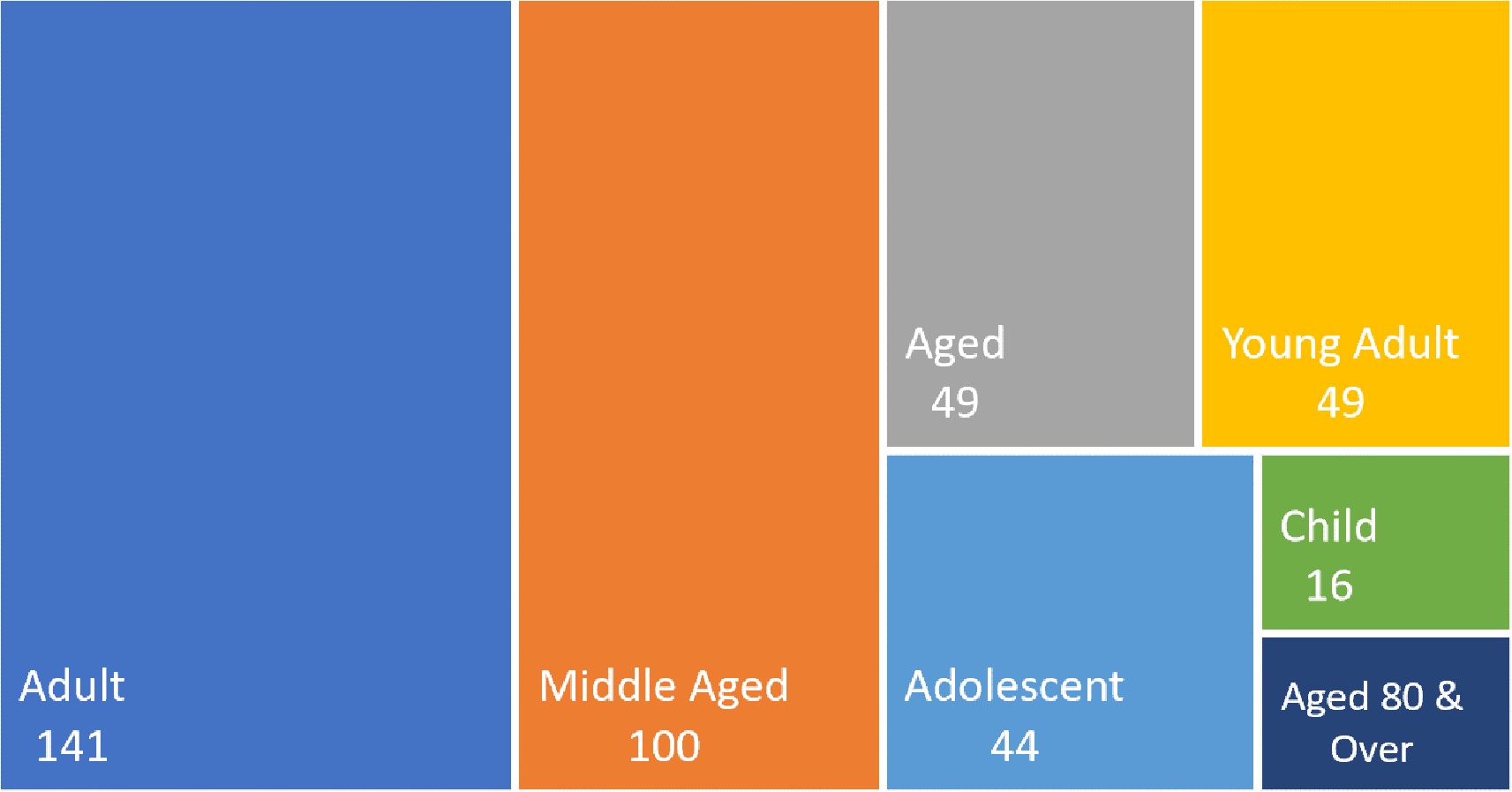
Figure 3. Age groups studied in IBD fatigue publications indexed in MEDLINE (via Web of Science).
Co-authorship network across the largest cluster of research institutes and countries on IBD fatigue
King’s College London was the most active research institute on IBD fatigue and had the largest co-authorship network, with close collaboration with Crohn’s & Colitis UK (a charity) and the University College London (UCL, a research institute) (Figure 4A). King’s College London also collaborated directly with Oslo University Hospitals (Norway), the second most active research institute globally, and with the Institute of Technology, Tralee (Ireland), while UCL collaborated with Belgium (ULB and CHU Liege) and France (CHU Rennes).
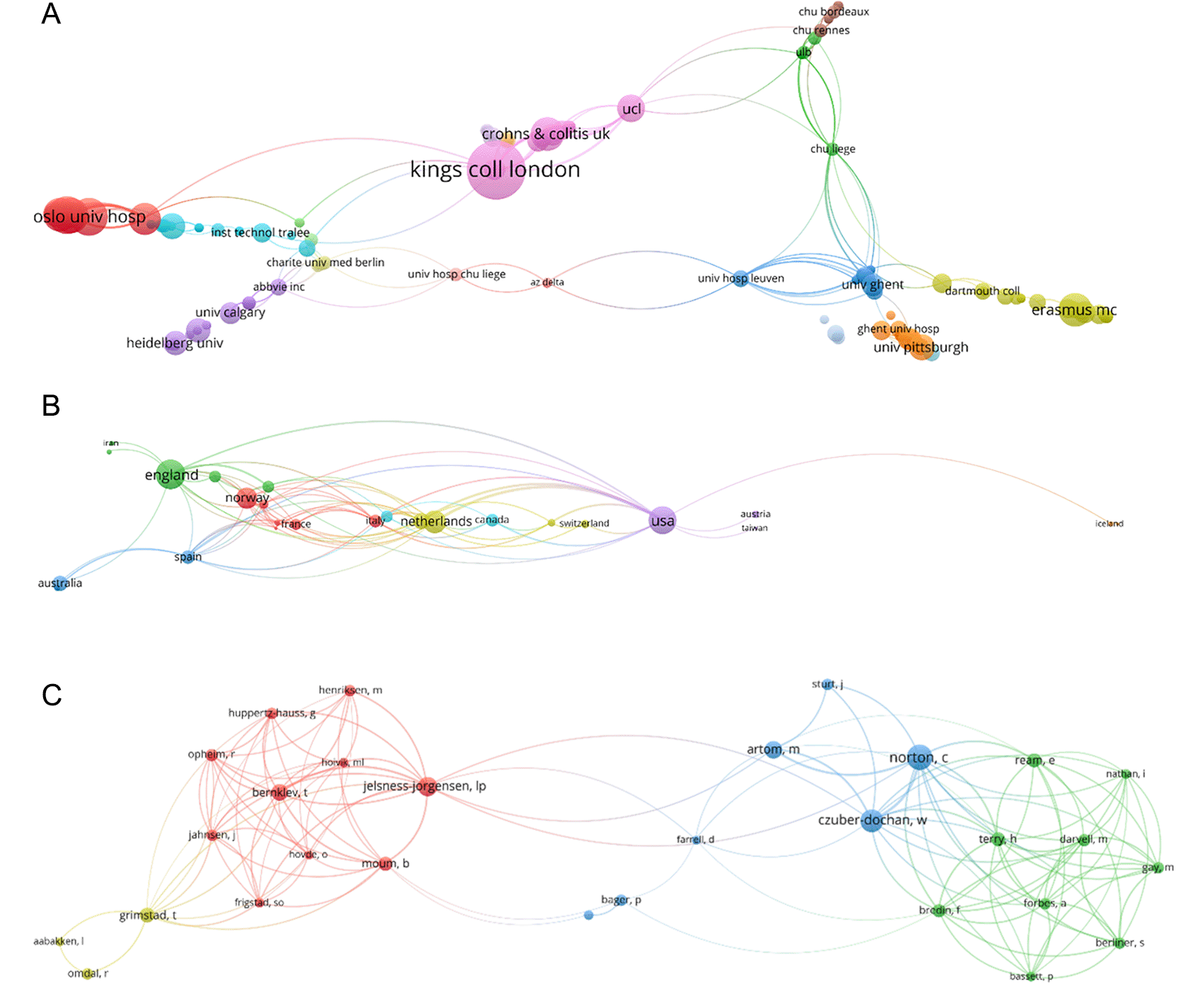
Figure 4. Collaboration among the institutes, countries, and researchers.
A) 523 organisations were identified. Some of the organisations in the network were separate from each other. The largest set of connections consists of 326 organisations. B) Some of the countries in the network were not connected to each other. The largest set of connections consisted of 26 countries. C) This review identified 1272 authors for 261 documents, with 50 authors with 5 or more documents. A subset of the 50 authors in the network were not connected to each other. The largest set of connections consisted of 29 authors. These findings are based on SCIE data.
Even though Belgian institutes collaborated with other Belgian and French institutes, their collaboration with the UK and Norway was not established. Ireland was the main link connecting Norwegian and British institutes to German and Canadian institutes, and Ghent University (Belgium) played a similar role in connecting French and the Netherlands’ most active institute (Erasmus MC) to the most active institute in the United States (University of Pittsburgh).
If we take all clusters into account, the collaboration across countries is more visible in a wired or star-shaped network with multiple core points (Figure 4B); however, the collaboration in the largest cluster showed a neuron- or loop-shaped collaboration across the most active institutes. Figure 4C shows the names of the authors in the largest collaboration cluster. Publications from 35 countries were identified (Figure 5).
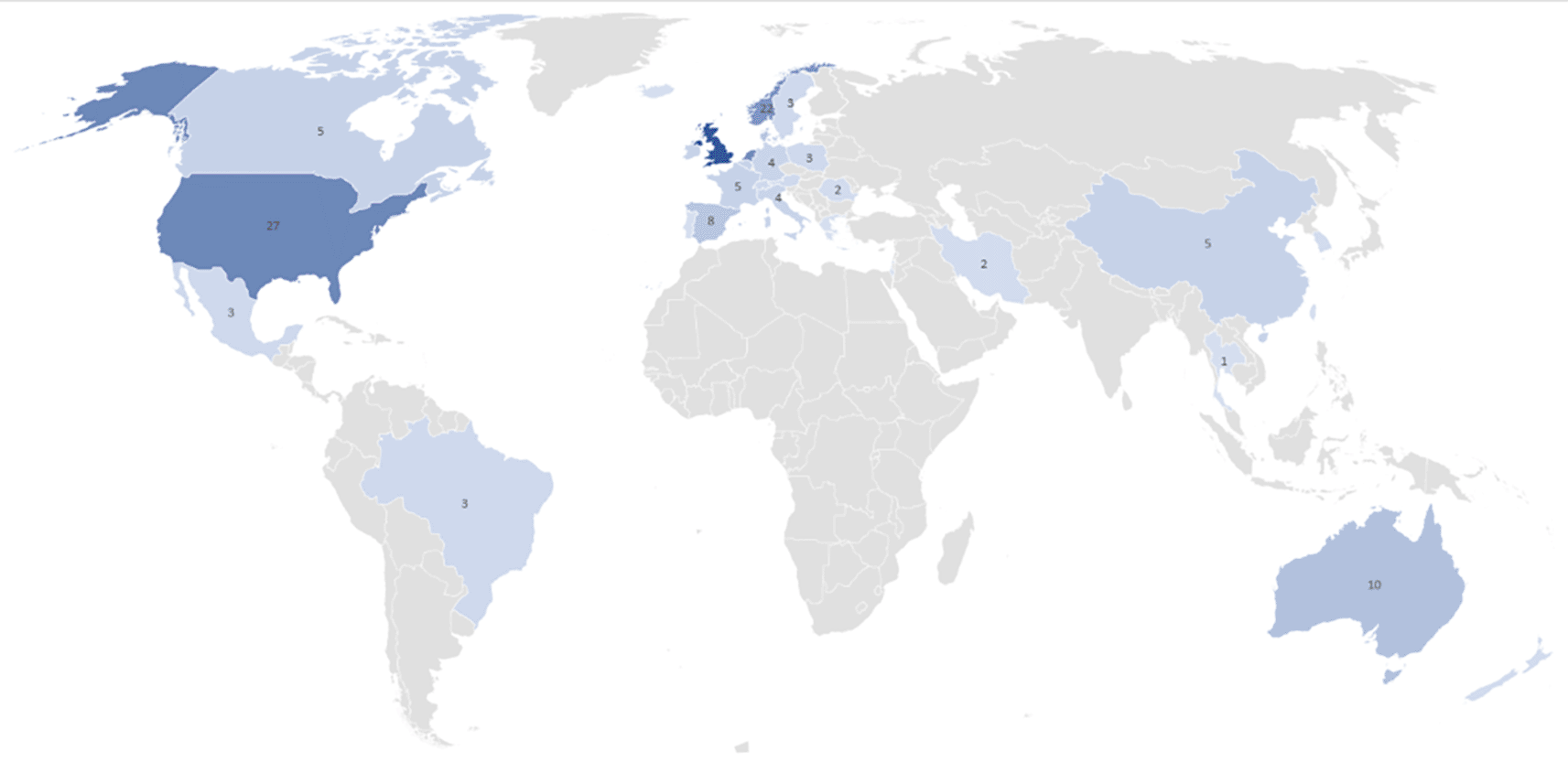
Figure 5. Countries' contribution to IBD fatigue.
Data source: Scopus; Search strategy: (TITLE (fatigue*)) AND (( TITLE (inflammatory AND bowel AND disease*) OR TITLE (colitis) OR TITLE (crohn*))); Search date: 21st August 2023; Number of results: 181 (6 had no recorded country; UK: 42; Netherlands: 25; Denmark: 8; Ireland: 5; Belgium: 5; Switzerland: 3; Australia: 3; South Korea: 2; New Zealand: 2; Taiwan: 1; Portugal: 1; Israel: 1; Iceland 1; Greece 1).
Author analysis from fatigue and IBD fatigue publications
In total, there were 1568 authors with publications on IBD fatigue. Two researchers from King’s College London, Norton and Czuber-Dochan, have contributed to the IBD fatigue field more than any other authors in the world. We identified research teams in six countries on the topic (Table 1).
Table 1. Authors with five or more publications on IBD fatigue based on PubMed data.
| Author | # of records | Affiliation(s) |
|---|
| British Team |
| Norton C | 20 | King’s College London, London, UK |
| Czuber-Dochan W | 19 | Kings College London, London, UK |
| Artom M | 11 | 1. NHS Digital, London, UK; 2. King’s College London, London, UK |
| Sturt J | 5 | King’s College London, London, UK |
| Ford AC | 5 | University of Leeds, Leeds, UK |
| Terry H | 5 | Crohn’s & Colitis UK |
| Norwegian Team |
| Jelsness-Jørgensen LP | 14 | Østfold University College, Halden, Norway |
| Bernklev T | 11 | University of Oslo, Oslo, Norway |
| Moum B (Moum BA) | 11 | University of Oslo, Blindern, Norway |
| Grimstad T | 10 | University of Bergen, Bergen, Norway |
| Omdal R | 6 | University of Bergen, Bergen, Norway |
| Hovde Ø | 5 | University of Oslo, Oslo, Norway |
| Henriksen M | 5 | Østfold Hospital Trust, Sarpsborg, Norway |
| Danish Team |
| Bager P | 10 | Aarhus University Hospital, Aarhus N, Denmark |
| Dahlerup JF | 7 | Aarhus University Hospital, Aarhus N, Denmark |
| Dutch Team |
| van der Woude CJ | 9 | Erasmus University Medical Center, Rotterdam, The Netherlands |
| Vogelaar L | 6 | Erasmus University Medical Center, Rotterdam, The Netherlands |
| US Team |
| Kappelman MD | 8 | University of North Carolina at Chapel Hill, North Carolina, USA |
| Long MD | 7 | University of North Carolina at Chapel Hill, North Carolina, USA |
| Ananthakrishnan AN | 5 | Harvard Medical School, Boston, Massachusetts, USA |
| Canadian Team |
| Graff LA | 6 | University of Manitoba, Winnipeg, Canada |
| Bernstein CN | 8 | University of Manitoba, Winnipeg, Canada |
| Other authors with five or more publications |
| Gibson PR | 7 | Monash University and Alfred Health, Melbourne, VIC, Australia |
| Peyrin-Biroulet L | 6 | University of Lorraine, CHRU-Nancy, Nancy, France |
| Danese S | 5 | Humanitas University, Milan, Italy |
| Thomann AK | 5 | Heidelberg University, Mannheim, Germany |
A focused analysis of UK authors with three or more publications on fatigue provided the list of additional authors for building a local collaborative network. The data identifies King’s College London as an international and national leading institute in fatigue research (Table 2).
Table 2. UK authors with three or more publications on fatigue based on PubMed data.
| Author | # of records | Affiliation(s) |
|---|
| King’s College London |
| Norton C | 20 | King’s College London, London, UK |
| Czuber-Dochan W | 19 | King’s College London, London, UK |
| Artom M | 11 | NHS Digital; King’s College London, London, UK |
| Sturt J | 5 | King’s College London, London, UK |
| Dibley L (Dibley LB) | 5 | University of Greenwich, (Avery Hill Campus); King’s College London, London, UK |
| Moss-Morris R | 3 | King’s College London, London, UK |
| Sweeney L | 3 | King’s College London, London, UK |
| Syred J | 3 | King’s College London, London, UK |
| Windgassen S | 3 | King’s College London, London, UK |
| Ream E | 4 | University of Surrey, Guildford; King’s College London, London, UK |
| Other UK institutes |
| Ford AC | 5 | University of Leeds, Leeds, UK |
| Terry H | 5 | Crohn’s & Colitis UK |
| Moran GW | 4 | University of Nottingham, Nottingham, UK |
| Radford SJ | 4 | University of Nottingham, Nottingham, UK |
| Darvell M | 3 | Crohn’s & Colitis UK |
| Bredin F | 3 | The Queen Elizabeth Hospital King’s Lynn NHS Trust, King’s Lynn, UK |
| Gracie DJ | 3 | St. James’ University Hospital, Leeds, UK |
| Tew GA | 3 | Northumbria University, Newcastle-upon-Tyne, UK |
Having a targeted look at the authors of IBD fatigue publications shows that even though the UK and King’s College London in particular have produced most publications on IBD fatigue, there are seven researchers with four or more relevant publications in Norway compared to six in the UK, five in the US, three in Canada, and three in the Netherlands (Table 3).
Table 3. Authors with four or more publications on IBD fatigue.
| Authors | # of records | Affiliation |
|---|
| Norton, Christine | 17 | King’s College London, UK |
| Czuber-Dochan, Wladyslawa | 14 | King’s College London, UK |
| Grimstad, Tore | 9 | Stavanger University Hospital, Norway |
| Bager, Palle | 8 | Aarhus University, Denmark |
| Jelsness-Jorgensen, Lars-Petter | 8 | Østfold University College, Norway |
| Kappelman, Michael D | 8 | University of North Carolina at Chapel Hill, USA |
| Omdal, Roland | 7 | Stavanger University Hospital, Norway |
| Bernstein, Charles N | 7 | University of Manitoba, Canada |
| Long, Millie D | 7 | University of North Carolina at Chapel Hill, USA |
| Bernklev, Tomm | 7 | University of Oslo, Norway |
| Artom, Micol | 6 | King’s College London, UK |
| Moum, Bjorn | 6 | University of Oslo, Norway |
| Dibley, Lesley | 5 | University of Greenwich, (Avery Hill Campus), UK |
| Peyrin-Biroulet, Laurent | 5 | University Hospital of Nancy, France |
| Graff, Lesley A | 5 | University of Manitoba, Canada |
| Borren, Nienke Z | 4 | 1. Massachusetts General Hospital and Harvard Medical School, USA; 2. Erasmus University Medical Center, The Netherlands |
| Dahlerup Jens, Frederik | 4 | Aarhus University Hospital, Denmark |
| Terry, Helen | 4 | Crohn’s & Colitis UK |
| Mikocka-Walus, Antonina | 4 | Deakin University Geelong, Australia |
| Van Der Woude, C Janneke | 4 | Erasmus University Medical Center, The Netherlands |
| Vogelaar, Lauran | 4 | Erasmus University Medical Center, The Netherlands |
| Ananthakrishnan, Ashwin N | 4 | Massachusetts General Hospital and Harvard Medical School, USA |
| Walker, John R | 4 | University of Manitoba, Canada |
| Sandler, Robert S | 4 | University of North Carolina at Chapel Hill, USA |
| Aabakken, Lars | 4 | University of Oslo, Norway |
| Kvaløy Jan, Terje | 4 | University of Stavanger, Norway |
Because of the importance of learning from relevant conditions with associated fatigue, we also conducted a cross-discipline analysis of authors who have worked on fatigue across more than one health condition. This analysis found 23 authors who have published on fatigue in more than one condition with chronic fatigue syndrome (19 cross-condition authors) found to be the dominant topic of interest among the researchers, 20 of whom were based in the UK. Eight researchers were identified as cross-condition researchers who have worked on IBD fatigue, as highlighted in grey rows in Table 4.
Table 4. Authors who have worked on fatigue associated with more than one healthcare condition. Based on PubMed data.
| Author | # of conditions | Healthcare conditions in relation to fatigue | Country |
|---|
| Ali, Sheila | 2 | CFS; RA | UK |
| Bennett, Barbara K | 2 | Cancer; CFS | Australia |
| Berk, Michael | 2 | CFS; IBD | Australia |
| Carvalho, André F | 2 | CFS; IBD | Brazil/Canada |
| Chalder, Trudie | 4 | CFS; RA; MS; PSF | UK |
| Cramp, Fiona | 2 | Cancer; RA | UK |
| Hollingworth, William | 2 | CFS; RA | UK |
| Hotopf, Matthew | 2 | Cancer; CFS | UK |
| Jones, David E | 2 | CFS; IBD | UK |
| Knoop, Hans | 2 | Cancer; CFS | Netherlands |
| Lincoln, Nadina B | 2 | MS; PSF | UK |
| Lloyd, Andrew | 2 | Cancer; CFS | Australia |
| Lovell, Karina | 2 | CFS; RA | UK |
| Lowe-Strong, Andrea | 2 | Cancer; MS | UK |
| Maes, Michael | 2 | CFS; IBD | Thailand/Bulgaria |
| Mills, Roger J | 2 | MS; PSF | UK |
| Moss-Morris, Rona | 2 | CFS; IBD; MS | UK |
| Mullis, Ricky | 2 | CFS; PSF | UK |
| Newton, Julia | 2 | CFS; IBD | UK |
| Ng, Wan-Fai | 2 | CFS; RA | UK |
| Norton, Sam | 2 | MS; RA | UK |
| Paul, Lorna | 3 | CFS; MS; RA | UK |
| Ream, Emma | 2 | Cancer; IBD | UK |
| Richards, Jim | 2 | CFS; IBD | UK |
| Rothwell, John C | 2 | MS; PSF | UK |
| Sharpe, Michael | 3 | Cancer; CFS; PSF | UK |
| Thomas, Shirley | 2 | MS; PSF | UK |
| Wearden, Alison | 2 | CFS; RA | UK |
| Wood, Leslie | 2 | CFS; MS | UK |
| Young, Carolyn A | 2 | MS; PSF | UK |
Top funders of IBD fatigue research
Here, we reported the funders listed in SCIE as funders of IBD fatigue research. In terms of the number of research projects funded, the data shows that Crohn’s & Colitis UK and AbbVie were the main funders of research on IBD fatigue (Figure 6).
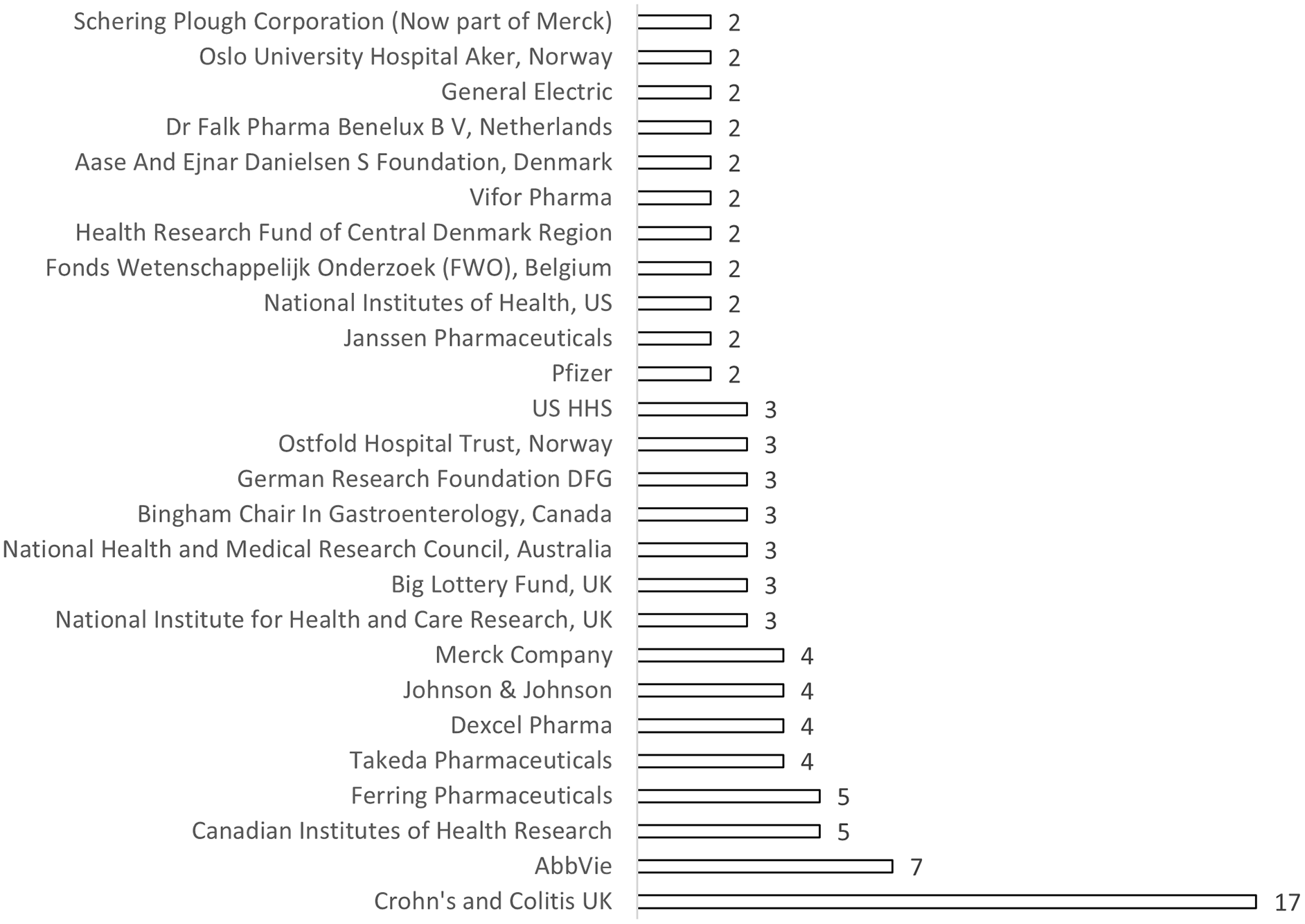
Figure 6. The funders of IBD fatigue research based on SCIE data.
Journals publishing IBD fatigue research
The majority of studies included in this review were published in journals focused on gastrointestinal conditions, with the Journal of Psychosomatic Research and PLoS One as the exceptions (Figure 7).
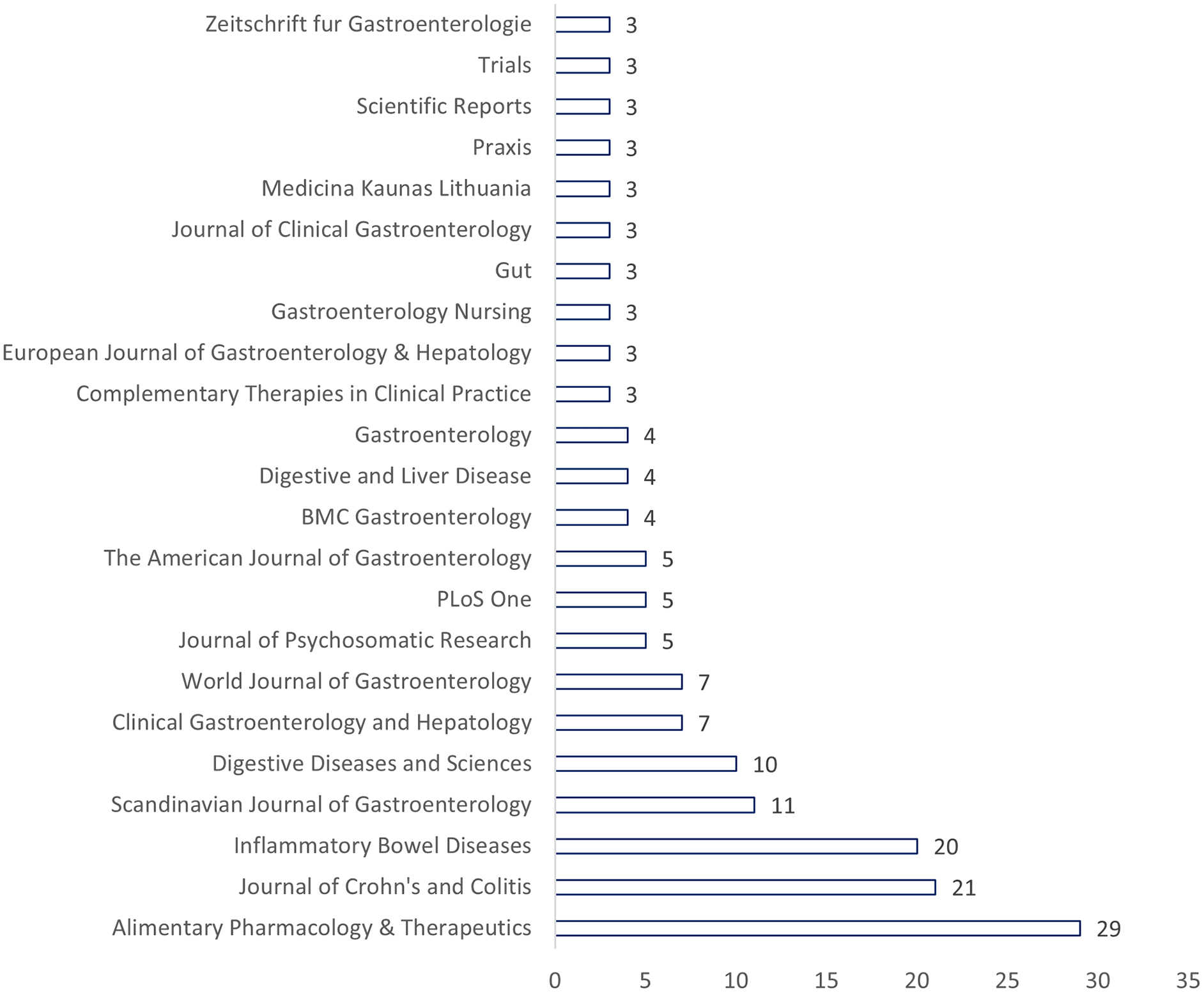
Figure 7. Journals with three or more publications on IBD fatigue.
Discussion
This study aimed to pave the way for a new research collaboration on fatigue by identifying the most relevant potential members, presenting a map of studied topics and remaining gaps, and highlighting potential funders.
Quality of life, followed by the severity of illness index and psychological outcomes (depression and anxiety), were the most researched topics in the publications reviewed. Exercise and Infliximab were the main interventions of interest while CRP and TNFα were the primary biomarkers of interest. This topic scoping or mapping is one way to identify topics leading to relevant systematic reviews on health-related quality of life (Radford et al. 2020) and psychological treatments (Emerson et al. 2021). While exercise can affect the quality of life (Abegunde et al. 2023), Infliximab is a TNFα blocking agent with some promising outcomes (Lawson et al. 2006) that have made it an attractive target for Cochrane reviews of IBD (Battat et al. 2017; Deol et al. 2017). A close match between the topic analysis from our research and topics of the systematic reviews on IBD fatigue shows the relevance of our findings and methods to identifying topics for conducting new systematic reviews. As a result, the appearance of topics such as the quality of life with exercise, psychological outcomes with psychological treatments, and TNFα with Infliximab explain and predict the topics of past and future systematic reviews.
There were only nine systematic reviews indexed in MEDLINE focusing on IBD fatigue. The earliest, published in 2010, evaluated the prevalence and patterns of fatigue in IBD patients (van Langenberg and Gibson 2010), followed by a 2013 systematic review that considered patients’ experience of and factors contributing to IBD fatigue (Czuber-Dochan et al. 2013). There was a gap until 2020, when three systematic reviews were published focusing on health-related quality of life (Radford et al. 2020), all interventions (Cochrane review; Farrell et al. 2020), and non-pharmacological interventions (Davis et al. 2020). A year later, a systematic review on psychological treatments (Emerson et al. 2021) and another on aetiology (McGing et al. 2021) were published. The most recent systematic reviews of IBD fatigue were focused on prevalence and risk factors (D’Silva et al. 2022) and biological treatment (Skjellerudsveen et al. 2023). Based on the abundance of literature on patient-reported outcome measures and the biomarker CRP, it is foreseeable that a systematic review of these topics may follow.
Another focus of this analysis was the most commonly employed research methods in studies of IBD fatigue. Observational studies were the most widely used study design, and consequently, surveys and questionnaires were the most used data collection method (Rosenbaum 2013). Observational studies are generally considered less costly to run than interventional studies (Thadhani 2006), and their high rate of use with IBD fatigue may be due, in part, to limited available funding for studying IBD fatigue in interventional studies.
One surprising result from our analysis was the limited number of qualitative studies on IBD fatigue. Fatigue is widely understood to be a subjective phenomenon (Greenhouse-Tucknott et al. 2022), and patients’ experiences and descriptions could shed light on the emotional and psychological effects of fatigue.
Likewise, we were surprised to find that all the research on IBD fatigue identified in our review was published in gastrointestinal journals. This suggests few journals publish fatigue-related research outside the gastrointestinal field, highlighting a gap that may be addressed by establishing a new journal dedicated to the cross-disciplinary views of IBD fatigue.
The incidence of IBD varies with age, with adults and middle-aged people (Keyashian et al. 2019) at the greatest risk. Our analysis found that publications on different age groups mirrored the IBD incidence in these groups, with a large body of research examining age groups with the highest incidence. The IBD incidence among age groups and the publication rate in these groups follow a normal, bell-shaped distribution.
King’s College London plays a key role in research on IBD fatigue, with close collaboration with Crohn’s & Colitis UK and UCL. Geographical proximity and historical connections (Alpaydin 2019) between King’s College London and UCL could be reasons for such collaboration. We found it interesting that although many institutes work on the same topic, they are not connected.
Regarding funding, we found that IBD fatigue research funding was biased toward high-income countries in the West, with most research occurring in the UK. Most research on IBD fatigue was funded by either a charity (Crohn’s & Colitis UK) or a pharmaceutical company (AbbVie), with limited funding from national medical funding bodies. However, national medical funding can play a significant role in supporting research. For example, we identified one recent study, supported by funding from the UK NIHR, that aimed to integrate evidence from quantitative and qualitative reviews on the effectiveness, cost-effectiveness and acceptability of interventions for fatigue in patients with chronic conditions (Burton et al. 2023).
Because of the geographical restrictions on the allocation and use of funding, many between-country collaborations may not involve financial arrangements for multi-centre studies and may be limited to co-authorship on papers. Therefore, a compelling case is to be made for international collaboration that funds and supports multi-country studies.
Research collaborations can promote synergy across disciplines and hold the potential to solve larger and more complex problems (Hart 2017). Due to fatigue’s multidisciplinary nature, collaboration may also increase the impact and reach of research outcomes. In the field of IBD fatigue, international collaboration among institutes could provide support for large initiatives that endeavour to move the field forward. Such initiatives could include the development of standards of best practice, developing clinical practice guidelines for fatigue as a cross-condition and multi-disciplinary problem, standardising patient-reported outcome measures or core outcome measures for fatigue, and a consensus-based definition of fatigue.
Conclusion
This study aimed to take the first steps towards establishing an IBD fatigue collaboration by summarising the most common research topics and methods in the field of IBD fatigue and identifying potential members and funders for an IBD fatigue collaboration. We presented a map of recent literature in the area and highlighted the gaps to enable researchers and funders to work together to tackle fatigue as a complex, cross-condition, and multi-disciplinary problem.







Comments on this article Comments (0)